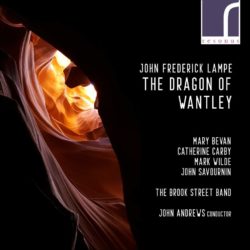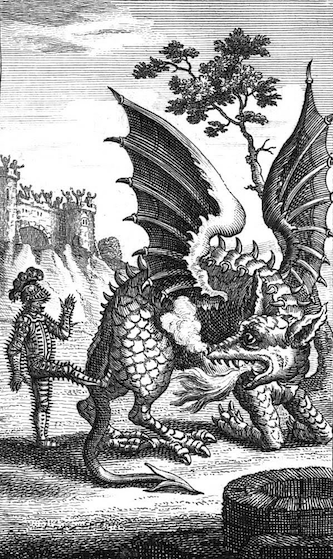Opera Review: “The Dragon of Wantley” — Knight Kicks Dragon in the Arse
More popular than The Beggar’s Opera, J. F. Lampe’s goofy opera of 1737 receives its first complete recording, and the performance is splendidly, subtly humorous.
John Fredrick Lampe: The Dragon of Wantley
Mary Bevan (Margery), Catherine Carby (Mauxalinda), Mark Wilde (Moore of Moore Hall), John Savournin (Gaffer Gubbins; the Dragon).
Brook Street Band, cond. John Andrews.
Resonus 10304 [2 CDs] 128 minutes
To purchase or to listen to the beginning of each track, click here.
Update: The 2-CD set is available at the bargain price of $14.50 through May 15, 2023.
 The Beggar’s Opera (1728) was not the only mock-opera that made a big splash in London in the first half of the eighteenth century. The Dragon of Wantley (1737), which here gets what seems its first recording, was performed even more frequently than that still-renowned work. It is freely based on the story told in a broadside ballad published in 1685, about a supposed immense dragon that terrorized a town in Wharncliffe Crags (South Yorkshire); the town’s name got reduced to Wantley in the ballad. Theories abound that the ballad really aimed to criticize certain landowners or that the opera denounced (indirectly) the taxation policies of Robert Walpole. (Oxford Music Online and Wikipedia both offer rich information on the work and its background.)
The Beggar’s Opera (1728) was not the only mock-opera that made a big splash in London in the first half of the eighteenth century. The Dragon of Wantley (1737), which here gets what seems its first recording, was performed even more frequently than that still-renowned work. It is freely based on the story told in a broadside ballad published in 1685, about a supposed immense dragon that terrorized a town in Wharncliffe Crags (South Yorkshire); the town’s name got reduced to Wantley in the ballad. Theories abound that the ballad really aimed to criticize certain landowners or that the opera denounced (indirectly) the taxation policies of Robert Walpole. (Oxford Music Online and Wikipedia both offer rich information on the work and its background.)
Whereas The Beggar’s Opera used existing tunes (popular songs, short arias from operas) separated by spoken dialogue, The Dragon of Wantley was sung throughout, to new music, which included recitatives to set up each aria. The composer, John Frederick (Johann Friedrich) Lampe (1703-51), was also a bassoonist; he had come to England from Germany and become prominent in the theater world.
The net result is a very normal-sounding opera. Lampe seems to have been well trained, or else he picked up good compositional habits from hanging around opera houses for so long. The arias in Dragon are short but tuneful and well structured, and the recitatives set the text clearly and pointedly.

Frontispiece of the libretto for The Dragon of Wantley. Moore kills the dragon by kicking him in the backside.
Which is a good thing, because the text, by Henry Carey, is where the humor of the work resides. On this recording we get to hear some lovely singers (the soprano is the renowned, silky-toned Mary Bevan, whose poised singing in a recording by Boston’s Handel and Haydn Society I praised here) singing such purposeful prattle as “He eat[s] them up / As one would eat an Apple”; “Houses and Churches / To him are Geese and Turkies”; “He drank up all their Coffee at a Sup / And next devour’d their Toast and Butter up”; and “[You] insulting Gipsey / You’re surely tipsey.”
Lampe’s music survives in two sources: one lacks the recitatives, the other condenses or omits many arias. The renowned musicologist Peter Holman has conflated the two sources, creating the most complete possible version, recorded here. The singers most often sing the texts straightforwardly, perhaps for fear of seeming to by trying too hard to “sell” it. As a result, the recording will bear up to repeated hearings. Another result: the more closely one follows the words, printed in the booklet, the more one will appreciate the humor.
Or one can simply listen to the work as a rather nice example of Baroque opera that happens to be in English. There are only five roles, including Moore of Moore Hall, who ends up killing the dragon “by a kick on the Back-side.” If only dragons were so easily and unceremoniously slain!
The bass-baritone takes two roles, as I show in the header. The four singers join nicely to give out the various choral numbers.
I’d love to see a production of this. It wouldn’t have to be note-complete, and, on such an occasion, I’d welcome a bit more tomfoolery than the excellent and savvy musicians here allow themselves.
Ralph P. Locke is emeritus professor of musicology at the University of Rochester’s Eastman School of Music. Six of his articles have won the ASCAP-Deems Taylor Award for excellence in writing about music. His most recent two books are Musical Exoticism: Images and Reflections and Music and the Exotic from the Renaissance to Mozart (both Cambridge University Press). Both are now available in paperback; the second, also as an e-book. Ralph Locke also contributes to American Record Guide and to the online arts-magazines New York Arts, Opera Today, and The Boston Musical Intelligencer. His articles have appeared in major scholarly journals, in Oxford Music Online (Grove Dictionary), and in the program books of major opera houses, e.g., Santa Fe (New Mexico), Wexford (Ireland), Glyndebourne, Covent Garden, and the Bavarian State Opera (Munich). The present review first appeared in American Record Guide and appears here with kind permission.
Tagged: John Fredrick Lampe, Mary Bevan, Resonus


As part of its 2023-24 season, the Boston Early Music Society produced a marvelously funny staging of this (or partial staging, since the orchestra sat at the rear of the stage and no sets were used) as part of its 2023-2024 season. Since the production was streamed to internet subscribers, there may be some hope that eventually it will be released on DVD or another medium that one can own and view repeatedly. The music s lovely, and the fine performers were obviously having a wonderful time.
New Sussex Opera are currently touring this delectable show in southeast England (spring 2024) – we’ve performed in Lewes and Brighton/Hove so far – next up in Tunbridge Wells, Winchester, London and Eastbourne. We’ve moved the action to the 1984 Yorkshire miners’ strike (set only a few miles from the original Wharncliffe in South Yorkshire), with the dragon appearing as a bearded Margaret Thatcher. All huge fun, and much enjoyed by audience and cast. Baffling that it isn’t performed more frequently. Our website (newsussexopera.org) has photos of the production. We loved the performance on the CD too.